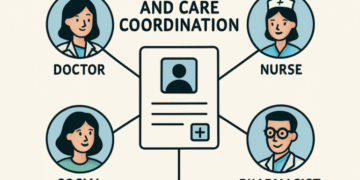Maintaining a healthy heart is beneficial for everyone, but women face unique challenges when it comes to women’s heart health, particularly if they live with autoimmune conditions. These conditions, which cause the immune system to attack the body’s tissues, can put women at an increased risk of heart disease. Understanding the connection between autoimmune diseases and women’s heart health is beneficial in taking proactive steps to protect well-being. Below, we explore the interplay between these conditions and the heart, the specific risks women face, and how to effectively manage and safeguard heart health.
Understanding Autoimmunity’s Heart Impact
Autoimmune diseases, such as lupus and rheumatoid arthritis, cause the immune system to attack the body, leading to chronic inflammation. This inflammation can damage blood vessels, increase plaque buildup, and raise the risk of atherosclerosis, a condition that narrows the arteries. Over time, these changes significantly impact cardiovascular health.
Some autoimmune conditions exacerbate heart problems by increasing the likelihood of inflammation in the heart muscle or lining, which can impair the heart’s ability to function effectively. These effects are why women with autoimmune diseases face a higher risk of developing heart issues. Understanding these risks is key to protecting women’s heart health through better prevention and treatment strategies.
Recognizing Women’s Heart Risks
Hormonal changes, especially the drop in estrogen during menopause, can increase heart disease risk in women with autoimmune conditions. This risk is further heightened by chronic inflammation linked to these diseases. Common treatments, such as corticosteroids, can raise blood sugar and cholesterol levels, contributing to cardiovascular concerns. Women may not exhibit the classic signs of heart problems. Symptoms like fatigue or jaw pain can be mistaken for less severe issues, leading to delayed diagnosis and treatment.
Managing Heart Health Proactively
Proactive management can help mitigate the risks that autoimmune conditions pose to women’s heart health. Here are key strategies to take into account:
- Regular Monitoring and Checkups: Women with autoimmune conditions should work closely with healthcare providers to monitor their heart health. Regular screenings for blood pressure, cholesterol, and blood glucose can help identify potential cardiovascular risks early, enabling timely intervention.
- Reducing Inflammation Through Lifestyle Choices: An anti-inflammatory diet rich in fruits, vegetables, whole grains, and healthy fats can significantly reduce inflammation. Omega-3 fatty acids, found in foods like salmon and walnuts, are particularly beneficial for heart health. Limiting processed foods and beverages high in sugar is equally necessary.
- Staying Physically Active: Moderate-intensity exercise, such as walking or swimming, not only reduces inflammation but also improves cardiovascular strength. Women should consult their doctors to create an exercise plan tailored to their needs without overexertion, especially if joint pain or fatigue are symptoms of their condition.
- Medication Reviews and Adjustments: Evaluating medications is beneficial. If corticosteroid use is unavoidable, healthcare providers may suggest alternative treatments or adjustments to minimize cardiovascular side effects.
- Stress Management: Chronic stress can worsen both autoimmune symptoms and heart health. Mind-body practices like yoga, meditation, and deep breathing can help women manage stress and positively influence physical health.
Protect Women’s Heart Health Today
Heart disease remains the leading cause of death among women, but a heightened understanding of risks tied to autoimmune conditions can empower women to take charge of their health. By recognizing warning signs, partnering with health professionals, and adopting heart-healthy habits, women can effectively manage their risks and enhance their overall well-being. Every woman deserves the opportunity to protect her heart, especially when faced with the added challenges posed by autoimmune diseases. Small, consistent steps today can lead to a healthier, stronger tomorrow. Take action now to safeguard your heart.










